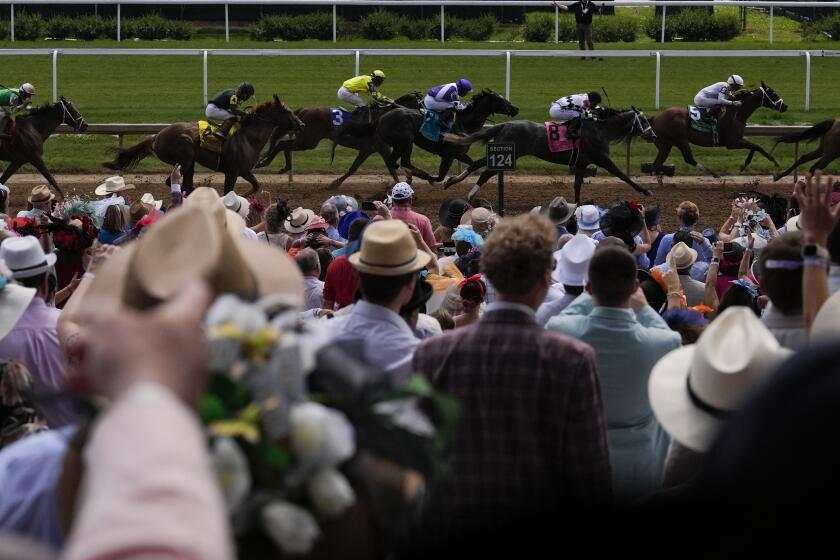State Board Approves an Increase in Jockey Weights
- Share via
Despite objections Thursday from racing secretaries at Santa Anita, Hollywood Park and Del Mar, the California Horse Racing Board took what might be the next-to-last step toward change in a prolonged debate over increasing jockey weights.
The Jockeys’ Guild, a national organization that represents many of the riders in California, petitioned the board more than a year ago to allow jockeys to ride with added weight. The board has wrestled with the issue but Thursday at Santa Anita the seven-member panel unanimously approved a change. The new rules are subject to a 45-day period of public comment, after which the board will vote on them again, possibly at its monthly meeting April 28 at Hollywood Park.
Under the proposed rules, the minimum weight for thoroughbred jockeys would be 116 pounds, an increase of four pounds. For thoroughbred handicap races, the minimum would be 112 pounds. The quarter horse minimum would go from the current 121 pounds to 123.
The guild had been asking for a 118-pound thoroughbred minimum.
“This is a significant compromise,” said Barry Broad, an attorney representing the guild. “Human beings have grown as a species, and this is a change that’s been a long time coming.”
According to Richard Shapiro, one of the board members, 40% of local jockeys have been vomiting to lose weight, and 20% either try to sweat off extra pounds or take illegal drugs to reduce.
“As a horse owner, I want a healthy guy up there on my horse,” Shapiro said, adding that he didn’t care “if they’re carrying a couple of pounds more.”
Some trainers, including Wayne Lukas and Bob Baffert, have opposed jockeys’ carrying more weight, which they say could accelerate horse breakdowns.
Jockeys have been riding with about 10 pounds of equipment, and if the new rules are approved, that weight will also be listed next to a horse’s name in the track programs.
“The public needs to know exactly what a horse is carrying,” Broad said. “There should be total transparency and honesty in the system.”
The racing secretaries -- Rick Hammerle from Santa Anita, Martin Panza from Hollywood Park and Tom Robbins from Del Mar -- see the proposed new rules as problematical.
“I don’t think the jockeys understand what’s being proposed,” Robbins said. “If you’re eliminating the scale of weights [weights prescribed for horses of certain ages and gender at certain times of the year], I don’t know what that means. In my mind, there’s still a lot of confusion.
“The industry in this state is already teetering. This system will throw the art of handicapping on its ear. I’m not sure how these weights will show up in the Daily Racing Form.”
Robbins said that the guild hadn’t made weight requests in other states. Panza said that he’d talked with his counterparts in New York and Chicago, and they reported no problems.
“If there’s no scale of weights, you won’t have horse racing,” Panza said. “In April, you’ll have 4-year-olds carrying 137 pounds, and 3-year-olds at 135 pounds. Horsemen will take their horses to Kentucky and New York, where they’ll be able to run with only 124 pounds. None of us understands these rules as they’re written, and we’re the ones who write the races.”
Jerry Moss, a horse owner and board member, said there had been enough discussion.
“It’s been over a year, and it’s wrong to continue to drag this out,” Moss said. “Let’s move on, and live with whatever decision we make.”
Under the new rules, male jockeys would be required to maintain at least 5% body fat. For female riders, body fat would be set at a minimum of 10%. Jockeys licensed before Dec. 31, 2004, would be exempt from the body-fat regulation for two years.
Hammerle was in favor of more discussion.
“I think you should talk to the jockeys before you walk off the cliff,” he told the board. “At this meet at Santa Anita, I’ve been using a 118-pound minimum, which is six pounds more than what’s in the book, and the overweights [that horses carry] are down to almost nothing.”
Speaking for the Jockeys’ Guild, Broad said that California could be setting an example for the rest of the country.
“The other states will feel compelled to go to a similar system,” he said.
Craig Fravel, executive vice president at Del Mar, said the body-fat regulation could result in enforcement problems. Drew Couto, president of the Thoroughbred Owners of California and brother of an ex-jockey, said that even the jockeys with two years of immunity might have trouble reaching the requirement.
“We need rules that the rest of the country will understand and adopt,” Fravel said.
*
In 2002, the late Prince Ahmed bin Salman of Saudi Arabia bought a 90% interest in War Emblem, turned him over to Baffert and about three weeks later they won the Kentucky Derby.
Baffert, who has won the Derby three times since 1997, picked up another prospect Thursday when Bob and Janice McNair bought a majority interest in Sort It Out from Larry Paltrowitz and his partners. Sort It Out, winner of Saturday’s Whirlaway Stakes at Aqueduct, will be transferred to Baffert’s barn at Santa Anita next week.
Sort It Out, who still must be nominated for the Triple Crown races with a $6,000 payment by March 26, was formerly trained by Allen Iwinski.
More to Read
Go beyond the scoreboard
Get the latest on L.A.'s teams in the daily Sports Report newsletter.
You may occasionally receive promotional content from the Los Angeles Times.










